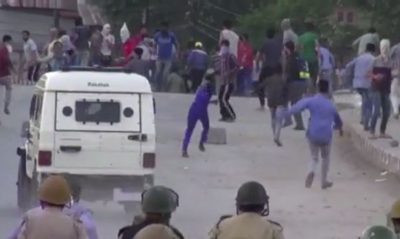Kashmir Territorial Dispute: A Potential Trigger for Nuclear War?

The disputed of territory of Kashmir, lying in the north of the sub-continent between India and Pakistan, does not often feature in the world news media, but recently the little-known yet most sensitive region has received attention, not only because of boundary clashes between the armies of India and Pakistan but because there have been some dramatic incidents in the Indian-administered region. Tension is rising, as indicated by comments from politicians and media in both countries, which have been swinging from casual abuse to extremes of frenzied condemnation.
The Vishva Hindu Parishad (VHP) in India is a right-wing, religiously-based ultra-nationalist political party with a large following which actively supports the ruling Bharatiya Janata Party, which bases its policies on the aspirations of a strongly nationalistic community. The leader of the VHP, Acharya Dharmendra, declared in a speech on June 2 that
“India should drop a nuclear bomb on Pakistan for creating tension at the border. It is a rogue nation and India must teach that country a lesson. It is important for peace in the Indian subcontinent”.
So far as can be determined, no Pakistani politician has yet made such a statement, publicly, at least, but the feeling in Pakistan as regards the use of nuclear weapons is much the same as in India: very many citizens of both countries believe that nuclear weapons just make a bigger bang. This is worrying, to put it mildly, especially as these two well-armed nations are squaring up to each other over the Kashmir imbroglio.
Before India and Pakistan became independent in 1947 there were some 560 feudal rulers of princely states, of which Kashmir was one of the few in which a Muslim majority were subjects of a Hindu maharajah. He decided to accede to India but the territory continued to be disputed between India and Pakistan, and remains in such status on the books of the UN Security Council.
The main UNSC resolution about Kashmir is 122 of 24 January 1957. It reminds the governments of India and Pakistan that
“the final disposition of the State of Jammu and Kashmir will be made in accordance with the will of the people expressed through the democratic method of a free and impartial plebiscite conducted under the auspices of the United Nations”.
India has tried for many years to convince the world that the 1972 India-Pakistan Simla Accord following their war of 1971 in some way invalidates UN Security Council resolutions regarding Kashmir. But the first paragraph of the Simla Agreement is “that the Principles and Purposes of the Charter of the United Nations shall govern the relations between the countries”. Then it states that
“the two countries are resolved to settle their differences by peaceful means through bilateral negotiations or by any other peaceful means mutually agreed upon between them” [emphasis added].
It is obvious that, contrary to Indian claims, there is no legal exclusion of the UN or any third party from mediation over Kashmir, given the covenant to include “any other means” towards settlement.
India, however, seized upon its selective interpretation of the wording of the Accord to unilaterally forbid the UN Military Observer Group in India and Pakistan (UNMOGIP) to carry out its duties to “observe and report” on both sides of the line of Control dividing the disputed territory. That Mission has forty uniformed observers who investigate cease-fire violations on the Pakistan side, but are not permitted to operate in Indian-administered Kashmir. This state of affairs neutralises objective UN reporting about the region, and one has to ask the question: who benefits from that?
Indian-administered Kashmir is a scenically beautiful region which is economically self-supporting by virtue of food production, tourism, and export of world-class handicrafts — carpets and papier-mâché and carvings. Its citizens desire only fair governance, but over the years have become increasingly alienated from the Indian mainstream, and the recent increase in anti-India violence in the Valley is an indication of infuriated frustration. The insurgency has settled into a grumbling resentment with occasional outbreaks of forcefulness, and some barbaric incidents such as the recent unforgivable murder of a young man.
On 9 May 2017 a young Indian army officer was kidnapped and murdered. He was aged 22, recently commissioned, unarmed, and home to attend a family wedding in Indian-administered Kashmir when five men burst into his father’s house and overpowered him, took him away and shot him dead after treating him despicably.
Lieutenant Ummer Fayaz was an enlightened Kashmiri from a humble background who had made good because he was intelligent and hard-working. He was, of course, a Muslim, which made him doubly vulnerable to those evil fellow-Muslims who killed him. Their achievements were to plunge a family into grief, deprive the world of a good upright citizen, spread even deeper hatred throughout India, and demonstrate that they were vile savages who murdered a defenceless man. These reptiles are not freedom fighters. They are simply murderous criminals who lack any sort of morality and possess not a shred of compassion for their fellow human beings. Which brings us to the treatment of another young man, Farooq Dar, a Kashmiri not much older than Lieutenant Ummer Fayaz, who survived to tell his tale, but also suffered at the hands of brutal bullies who had no fear of justice being applied.

According to the Economist, a reputable publication with no axe to grind in the India-Pakistan imbroglio over Kashmir, Mr Farooq Dar “suffered a severe beating” by Indian soldiers and was then “tied up on a spare tyre attached to the front bumper of an armoured jeep. Indian soldiers claimed he had been throwing stones. Mr Dar was driven in agony through villages… The soldiers reckoned the sight of him would deter others from throwing stones at their patrol”.
By far the majority of the citizens of Indian-administered Kashmir who object to draconian Indian rule in the disputed territory are peaceful and want matters to be resolved politically, in accordance with Security Council Resolutions, but some have resorted to barbarism, and unfortunately the Indian army and paramilitary forces have lowered themselves to the level of the extremists. The use of pellet-firing shotguns to deliberately blind protestors was particularly malevolent, but in line with the recent statement by India’s army chief that
“This is a proxy war and proxy war is a dirty war. It is played in a dirty way… You fight a dirty war with innovations”.
Like blinding people. The Indian Express reported that after one demonstration in 2016, doctors performed nearly 100 operations on people with pellet gun injuries. Sixteen had been blinded. Welcome to free Kashmir.
As Human Rights Watch observed, “a major grievance of those protesting in Kashmir is the failure of authorities to respect basic human rights”, but the whole Kashmir catastrophe is about human rights, and it is time India and Pakistan devised a solution about the disputed territory. Countless lives would be saved if these governments eschewed the crude and dangerous attractions of ultra-nationalism and agreed to settle the dispute by referring it to independent arbitration. There is no possibility that India would ever agree to surrender the territory it occupies, because no Indian government would survive five minutes after making such a decision. Pakistan must live with the unpalatable fact that it has lost the territory and must make the best compromise.
At this moment the disagreement between India and Pakistan over Kashmir is one of the world’s most dangerous confrontations. It could only too easily lead to nuclear war, given Pakistan’s preparedness to use tactical nuclear weapons if Indian forces penetrate Pakistani territory, as they will probably do if there is a major fire-exchange incident along the Line of Control.
Then there will be a world catastrophe, because there is no such thing as a limited nuclear war.
The Line of Control in Kashmir should be declared the international border, with minor adjustments effected after independent mediation. Prime Minister Narendra Modi of India and Prime Minister Nawaz Sharif of Pakistan should meet and declare that the Kashmir imbroglio is over, and that the countries have agreed to go forward to mutually beneficial cooperation.
Then they could go to Norway to accept their Nobel Peace Prizes.
Brian Cloughley is a British and Australian armies’ veteran, former deputy head of the UN military mission in Kashmir and Australian defense attaché in Pakistan.
All images in this article are from the author.


